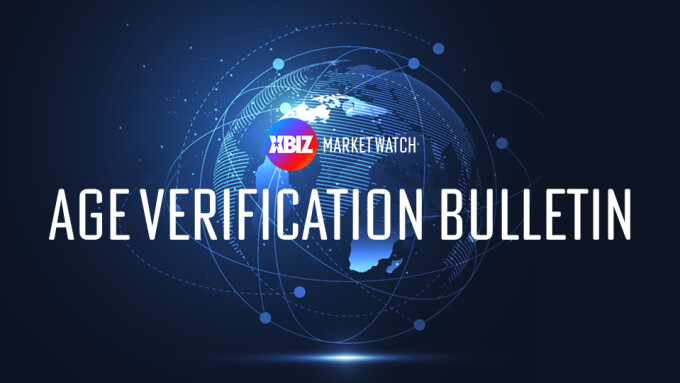Industry stakeholders and free speech advocates have anxiously been awaiting the Supreme Court’s decision in Free Speech Coalition v. Paxton, which could significantly impact state age verification laws around the country. In the meantime, state legislatures continue to weigh and pass AV bills, AV tech providers continue to tout their services, and legal challenges continue to play out in the courts — with some cases on hold pending the SCOTUS ruling in Paxton.
This roundup provides an update on the latest news and developments on the age verification front as it impacts the adult industry.
Michigan Introduces AV Legislation
On Thursday, Michigan became the latest state to put itself on the AV map as Republican state Sen. Thomas A. Albert introduced SB 191, the “Material Harmful to Minors Regulation Act.” The bill gives enforcement authority to Michigan’s attorney general, who would be required to give violating sites 45 days’ notice and the opportunity to comply before initiating a civil action seeking damages of up to $10,000.00 per violation.
The bill covers sites on which more than 33.33% of the total material is deemed harmful to minors. That rule has appeared consistently in AV bills around the country, but has raised questions in the media, the courts and in state houses about what metrics would actually be used to determine that material harmful to minors constitutes one-third of a website’s contents, since the provisions could be interpreted to refer to anything from number of videos to file size or content hours.
The bill has been referred to the Michigan Senate’s Regulatory Affairs Committee.
Bills Making the Rounds
Here is a list of other AV legislation currently making its way through state legislatures, which has seen action in the past week:
Wisconsin: AB 105 and companion bill SB 130 were introduced March 10 and have been making their way through committees and the amendment process. This legislation would be enforced via private lawsuits — the “bounty law” approach, which some states are relying upon in order to avoid litigation against the state or attorney general’s office — and would require websites to block VPN traffic. This latter provision is clearly a response to frequent criticisms of site-based AV as ineffective due to easy workarounds such as VPNs.
West Virginia: HB 2689, enforceable via private lawsuits with violators also subject to civil fines, is awaiting a hearing in the state’s House Judiciary Committee.
Arizona: HB 2112, enforceable via private lawsuits, has passed the state House as well as the state Senate’s majority and minority caucuses, putting it on track for likely approval.
Numerous other bills, introduced earlier in the legislative session, are sitting on committee agendas awaiting action. Free Speech Coalition maintains and updates a list of pending AV legislation here.
Commentary: When Bills Make No Sense — Literally
Age verification laws often spark debate over their intent and outcomes. Nominally intended to prevent minors from accessing adult content, in practice they often have the effect of stifling adult access to porn and chilling legally protected speech. Less frequently discussed, however, is the frequent clumsiness, ignorance and seeming incompetence in how these bills are being drafted and debated.
As XBIZ reported last week, Wyoming recently enacted an AV law whose definition of “material harmful to minors” is “any picture, image, graphic image file, film, videotape or other visual depiction that is obscene or is child pornography.” By requiring age verification for viewing material that is already illegal, the laws seems to be conflating legal and illegal content.
Meanwhile, an age verification bill that passed the Iowa state House this week does not even mention "material harmful to minors," which has become the standard terminology used in AV legislation. Instead, it cites "obscene material" as requiring age verification for viewing. This reflects confusion over the difference between obscenity and legal pornography.
That confusion has been further exacerbated as many state AV bills and laws have defined “harmful to minors” by incorporating legal language traditionally used to define “obscenity.”
The phrasing in the Iowa bill and the Wyoming law could ultimately prevent them from applying to the adult sites at which they are aimed, though Free Speech Coalition has warned sites against making any such assumption.
Meanwhile, Florida lawmakers recently introduced legislation to require manufacturers to equip tablets and smartphones with a default “porn filter.” Confusingly, HB 1503 and its identical companion bill, SB 1718, do not require that users with device passwords be given an opportunity to disable the filter entirely — though they do prohibit users without passwords from doing so. In addition, the bills appear to equate “a user with a password” with an adult supervising a minor’s device use, though strangely this is never specified.
Throughout the past few years since Louisiana sparked the AV trend by passing the first such state law, debates in state legislatures across the country have included exchanges and commentary reflecting a very limited understanding of the technical, privacy and free speech aspects of age verification. State lawmakers stumble over terms and concepts such as “virtual private network” and “strict scrutiny” in gaffs sometimes reminiscent of former Alaska Sen. Ted Stevens’ infamous and frequently mocked 2006 description of the internet as a “series of tubes.”
This calls into question not just lawmakers' intent — many have openly admitted that they hope AV laws prevent not just minors but adults from viewing porn — but also their basic competence to legislate such a complex issue.
Watch XBIZ.com for future Age Verification Bulletin roundups.








